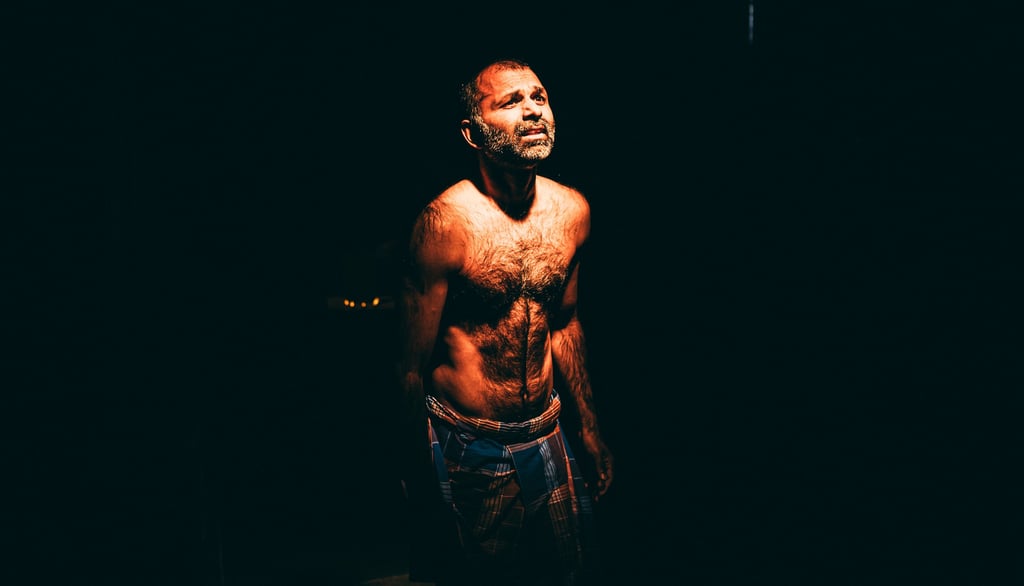REVIEW: Second Class Queer - Six conversations. Five strangers. Two memorials. One moment of acceptance.
Review Date: 31st July 2025@Theatro Technis
REVIEWS
Lin Song
8/2/20253 min read


Written and performed by Kumar Muniandy, Second Class Queer is a raw and intimate exploration of what it means to exist as both queer and a person of colour, caught between inherited trauma and the unbearable lightness of modern “tolerance” from the Western world.
After losing his mother in the aftermath of a homophobic attack, Krishna carries a guilt that words cannot wash away. He leaves Malaysia, where being gay is illegal, and comes to Berlin. But at the speed dating event, he finds not freedom, but five conversations that reflect every struggle he thought he had left behind, masked under ignorance, arrogance, fetishisation, and shallow empathy. Only the fourth person—someone who shares his experience as a person of colour—truly understands. Their dialogue is a moment of clarity: two people from different worlds, united by the same quiet struggle.
All other characters are presented as recorded voices, but Kumar performs with such natural flow that you’d never notice. The debates, no matter how heated, are perfectly timed, never missing a beat. Kumar sits alone in the centre of the stage, yet through his eyes, the audience almost becomes the other half of the conversation. Silent. Watching. Being watched. Being asked that simple question: Is there truly a place for people like us?
The production is simple yet filled with powerful imagery. At the beginning of the show, an empty picture frame stands in the centre—a memorial for a boy killed in Malaysia by homophobic violence. His name is erased from the media. And when Krishna tries to tell this boy’s story, the boy’s name is censored with mechanical beeps. You cannot see him. Cannot hear him. Cannot speak of him.
But Krishna remembers. Every day of his life, he mourns that boy, mourns his mother, mourns himself. And yet, amid this grief, the dialogues are light-hearted—even hilarious. But the laughter feels hollow; behind every joke lies a wound that hasn’t healed. The world demands acceptance: to laugh off negligence, to excuse ignorance, to forgive cruelty. It asks him to leave behind the place where he was born, to let go of his culture to be himself.
Krishna is not a “perfect victim” in this story. He refuses judgments about his origins, yet he judges others for their body shapes. He is conservative, vulnerable, but also honest and deeply sincere.
At the end of the speed dating, the fourth person returns, encouraging Krishna to speak to his mother, to tell her who he truly is. “Talk to her. She’ll hear you.” And so, Krishna tells the story—a story of a boy who was killed by a crowd that hated him for existing.
Second Class Queer is raw, painful, and deeply personal. And yet, it’s a story that demands to be heard. It leaves us with a simple yet impossible question: For people like us, where is there left to stand?
★★★★
©️Photo by Sara Moralo


This show is going to:
©️ Photo by Faki Festival, Zagreb
About Kumar Muniandy: a queer Tamil Malaysian actor, writer, and theatre-maker based between London and Berlin. Kumar was born in Kuala Lumpur to a low-working-class family and migrated to the UK in 2003. Trained at the Guildhall School of Music and Drama while working minimum-wage jobs to survive. After years of auditioning for stereotypical roles, Kumar created Second Class Queer to reclaim the stage and amplify stories from the margins. Kumar developed this play with the support of Kumar's mentor, Mojisola Adebayo.
Sound Behind Curtain
A place for all Asian artists.
© 2026 Sound Behind Curtain. All rights reserved.
Your gift keeps the curtain rising for Asian creatives.
About
Contact
